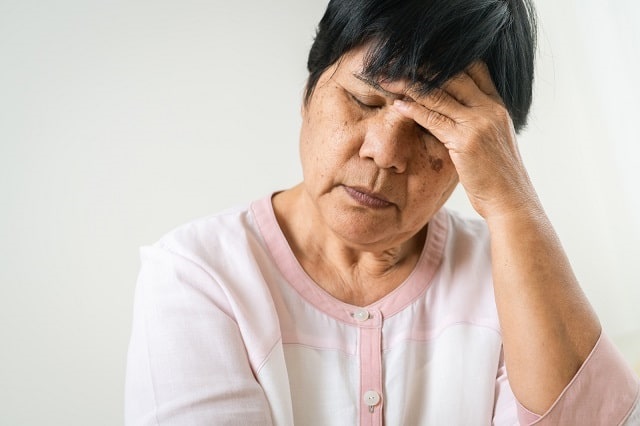As your elderly mother gets older, you’re naturally concerned about her physical and mental health. And of course, you want her to be happy. But what if it seems like your elderly mother is never happy? Loneliness and social isolation, depression, medication side effects, symptoms of disease, and other factors can contribute to your elderly mother’s mood (and possibly always wanting attention). Here’s what to look for and steps you can take to help your mom embrace all that life has to offer and experience true happiness once again.
What’s Causing My Elderly Mother’s Unhappiness?
First and foremost, you’ll need to find out why your mom is so unhappy. Below, we’ll discuss a few of the most common reasons why your elderly mother might be unhappy and what you can do to help.
Medication Side Effects
If your mom has recently started taking a new medication, this is always a good place to start ruling things out. Read the patient information packet to learn about the potential side effects of new medicines or ask your mother’s doctor or pharmacist.
If you think a new medication might be contributing to your mother’s negative mood, consult with her doctor. There may be alternative medications she can take or ways to alleviate the side effects she’s experiencing. And in some cases, side effects are transient, meaning they lessen or go away completely after a time.
Sleep Disruptions or Insomnia
Sleep disturbances can affect anyone’s mood. Ask your mother if she’s sleeping well at night and for how many hours. There are tools you can use to track the quality of her sleep, such as smartwatches, or you can spend a night monitoring her sleep yourself. Look for things like how many times she gets up to use the restroom or get a drink and whether she’s restless overnight, as well as how long it takes her to fall back asleep after waking during the night.
You’ll also want to keep an eye on how refreshed she appears to feel when getting up for the day and whether she has difficulty staying awake during normal daily activities such as watching television. Talk to her healthcare provider if you think she’s experiencing sleep disruptions. She may need to undergo a sleep study to identify the root of the problem, such as a sleep disorder. Often, however, simple changes like sticking to a consistent nighttime routine can help.
Loneliness
More than one-third of adults aged 45 and older experience loneliness. Additionally, one-fourth of adults aged 65 and older are considered socially isolated. Loneliness increases the risk of serious health problems, such as a 50% increased risk of dementia and higher rates of depression and anxiety. Additionally, loneliness and isolation are associated with a 29% increased risk of heart disease and a 32% increased risk of stroke.
If you find that your mother is demanding more and more attention or you recognize that she’s spending a great deal of her time alone or spending less time with family and friends, it’s possible that loneliness could be the root of her unhappiness. Look into local opportunities for older adults at senior centers or consider whether it’s time for her to move to a retirement community. Life at a continuing care retirement community is vibrant, and your mother’s days will be filled with opportunities to connect and socialize with other adults in the same stage of life. Plus, with multiple levels of care on the same campus (independent living, assisted living, skilled nursing care, etc.), you’ll have peace of mind in knowing that her care needs will be met as they change throughout her life.
Depression
According to the CDC, 15-20% of older adults aged 65 and older have experienced signs of depression. While depression is common among older adults, it’s not a normal part of aging, and the warning signs shouldn’t be ignored. These signs and symptoms may indicate that your elderly mother has depression:
- Feelings of worthlessness
- Lack of interest in activities she once enjoyed
- Decreased energy or fatigue
- Irritability
- Changes in appetite
- Changes in sleep (sleeping more or less than normal)
- Feelings of hopelessness
- Difficulty concentrating on tasks or remembering things
- Physiological symptoms such as digestive problems, headaches, or persistent aches and pains
- Thoughts of suicide or suicide attempts
It’s crucial to distinguish normal periodic sadness from clinical depression, but it can only be diagnosed by a qualified healthcare provider. If you suspect your mother might have depression, talk to her healthcare provider right away. They’ll be able to make an accurate diagnosis and recommend the best treatment to manage your mom’s symptoms.
Cognitive Decline
Cognitive decline is another common reason older adults experience sadness, unhappiness, or irritability. In fact, the symptoms of depression and dementia can be similar, as dementia can lead to personality changes. If your mother is experiencing cognitive decline, she may be frustrated with herself because she can’t perform simple tasks she once could do with ease or because she’s increasingly forgetful. Not only is it frustrating to not recall where you put the car keys, but thinking about possibly losing your cognitive abilities – or the simple fact that you’re getting older – can also cause anxiety, which can lead to irritability.
The key to addressing this issue is patience and understanding. If your elderly mother hasn’t been diagnosed with dementia or Alzheimer’s disease and you suspect that she may be experiencing cognitive decline, talk to her doctor. Early diagnosis is key, and she may be able to take medications that can help to slow the progression of the disease.
There are many potential causes of unhappiness among older adults, and many can be addressed by ensuring that your mother has ample opportunities to interact with family and friends and socialize with like-minded older adults. Additionally, if never being happy is impacting your desire and bandwidth to care for your mother, then identifying how to help can improve your relationship. If you think it might be time for your mother to consider moving to a retirement community, schedule a tour to learn about the many services and amenities residents enjoy at Arbors of Hop Brook. We provide a comprehensive continuum of care and a focus on total wellness, including intellectual, spiritual, physical, vocational, social, emotional and environmental wellness, to ensure that residents can enjoy a vibrant, active, and happy lifestyle.
Common Questions About Elderly Parents Never Being Happy
How can I encourage my elderly mother to engage in social activities or hobbies?
Encouraging your mother to participate in social events or hobbies can help improve her mood and overall well-being. You might suggest activities that align with her interests, such as joining a book club, attending community events, or taking up a new hobby like painting or gardening. Offer to join in these activities can provide the support she needs to get started.
How do I approach the topic of seeking professional help without upsetting my mother?
Discussing mental health can be sensitive. Approach the conversation with empathy and concern, emphasizing that you want her to feel happier and more fulfilled. You might suggest a general health check-up that includes mental well-being or offer information about counselors or support groups that specialize in elder care.
What strategies can I use to manage my own stress while caring for my unhappy elderly mother?
Taking care of yourself is crucial when supporting someone else. Consider setting boundaries to ensure you have personal time, seeking support from friends or caregiver support groups, and engaging in stress-relief activities like exercise or meditation. Remember, caring for your well-being enables you to provide better support to your mother.
Are there community resources or support services available that can assist my mother and our family?
Many communities offer resources for the elderly, such as senior centers, in-home care services, and mental health counseling. These services can provide social interaction opportunities for your mother and respite for family caregivers. Contact local government agencies or nonprofit organizations to learn about available programs.


